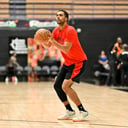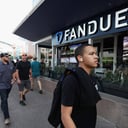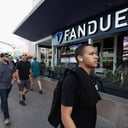Adam Silver is the NBA’s Commissioner. He is also Adam Silver, JD ’88, University of Chicago Law School. And thus, being “trained at law,” as the great Howard Cosell would say, Silver would not use the phrase “cardinal sin” carelessly.
When Silver met with reporters following the NBA’s most recent Board of Governors meeting last week, he was asked specifically about the NBA’s investigation of the Toronto Raptors’ two-way big, Jontay Porter, who was suspected of betting on NBA games. A reporter asked Silver what his options were as commissioner to discipline Porter if the league determined the 24-year-old indeed had bet on NBA games.
Advertisement
“As to your question about the consequences, I have enormous range of discipline available to me,” Silver said in the news conference. “But it’s a cardinal sin, what he’s accused of, in the NBA, and the ultimate extreme option I have is to ban him from the game. That’s the level of authority I have here because there’s nothing more serious, I think, around this league when it comes to gambling and betting on our games, and that is a direct player involvement. The investigation is ongoing, but the consequences could be very severe.”
So, while the NBA didn’t use the word “lifetime” in its announcement Wednesday that it had banned Porter for betting on NBA games and sharing proprietary information with a gambler, you can be pretty confident about this: Jontay Porter, the younger brother of Denver Nuggets forward Michael Porter Jr., will never play in the league again. This will not be a “normal” multi-year suspension like the league imposes on players who fail the terms of its substance abuse program. Those players can apply for reinstatement in two years.

GO DEEPER
Koreen: NBA’s banishment of Jontay Porter is about money and perception, not morality
So can Porter. But I wouldn’t, uh, bet on him getting back in. Think Pete Rose.
The NBA didn’t throw the book at Porter. They threw the whole library at him.
The league’s release Wednesday laid out a devastating case against Porter, detailing how he set up so-called “prop bets” involving himself with gamblers, so they’d bet the “under” — a wager that Porter wouldn’t hit a specific statistical number in a game — when Toronto played the Sacramento Kings on March 20. That night, the “over/under” on Porter’s predicted stats for that game was 7.5 points and 5.5 rebounds, numbers higher than his season averages of 4.4 points and 3.2 rebounds. But Porter had played much more in the four games that preceded that March 20 game, including scoring a season-high 14 points in a game at Portland March 11. So the line was not a crazy one.
Advertisement
But Porter played just three minutes against Sacramento before taking himself out of the game, saying he felt ill. And, thus, the “unders” hit that night.
The league determined that “another individual with whom Porter associated and knew to be an NBA bettor subsequently placed an $80,000 parlay proposition bet with an online sports book, to win $1.1 million, wagering that Porter would underperform in the March 20 game,” according to its release. But because of the “unusual” betting activity before tipoff on Porter’s prop bets for that game, the $80,000 prop bet was “frozen,” the league said, and not paid out.
In addition, according to the release, from January 2024 through March 2024, Porter placed at least 13 bets on NBA games using an associate’s online betting account.
And, ominously, the NBA’s release noted that its findings were, and are, “based on the information available to league investigators at this time. The league’s investigation remains open and may result in further findings. The NBA has shared and will continue to share information with federal prosecutors about this matter.”
The league thus looks to treat and cut off the suspected antibody flowing in its bloodstream, cauterize the wound, and call it a day.
But it’s not that simple.
If the NBA thinks Jontay Porter is the only one of its current employees that’s wagered a buck or two, or $15, or $22,000, on one of its games, whether for or against that employee’s/employees’ teams, that’s a whole ‘nother level of naive.
This is the world that pro sports — hell, college sports, too, and millions of Americans — has helped create.
The American Gaming Association reported in February that Americans wagered a record $119.84 billion in legal sports betting in 2023, translating to more than $10 billion in revenue for the gaming industry, as more and more states legalized sports betting.
Advertisement
Our national obsession with betting on everything, at every moment, of every sporting event, has created an ecosystem awash in a desperate clawing for money: money not earned, but won on a whim, with a push of a betting app. Since the Supreme Court essentially legalized sports betting in the United States in 2018, the sports world has been flipped on its head. After decades of treating gambling as a third rail, almost every major U.S. pro sports league has not only gotten comfortable associating betting on its games, but also encourages it on a daily basis, with a cacophony of ads during games from each league’s betting partners.
(And here, we must note, The Athletic also has a business partnership with a gambling entity, BetMGM.)
The line from prop bets to increasingly boorish fan behavior at NBA games stemming from fan bets on games to Jontay Porter — and, to worse — is a clear, red, pulsating one. No one knows where it leads, or where, or if, it stops anywhere short of catastrophe – catastrophe being someone a little more famous and more beloved than Jontay Porter getting neck-deep in wagering.
Major League Baseball apparently dodged a huge bullet when a federal investigation determined that super-duper-über star Shohei Ohtani was the victim, rather than a perpetrator, of a gambling scheme conducted by his now-former interpreter, who helped himself to $16 million of the Los Angeles Dodgers’ superstar’s cash over the last several years. The NFL got nicked when it suspended then-Atlanta Falcons receiver Calvin Ridley for the entire 2022 season for violating the league’s gambling policy by betting on NFL games during the 2021 season. He was reinstated in 2023, playing last season for the Jacksonville Jaguars, and signed a four-year deal worth up to $92 million last month with the Tennessee Titans.
The NBA got as close as it ever wanted to its own Dante’s Inferno-level of conflagration when it had to investigate Michael Jordan in 1993, after Jordan disclosed in court that a $57,000 check he’d written to a North Carolina man was not a “loan” to the man to help him build a golf course, as Jordan had initially claimed, but a payment to settle a gambling debt Jordan owed him. Subsequently, a second man, who’d played golf with Jordan on multiple occasions, claimed that Jordan owed him more than $1 million after losing bets to him during matches. The two settled at $300,000.
The league concluded then that Jordan hadn’t bet on NBA games, and had violated no league rules.

GO DEEPER
Inside the NBA’s process of investigating players for suspicious betting activity
The flames got closer when former referee Tim Donaghy acknowledged that he’d bet on NBA games, and insinuated that other referees with similar information about team tendencies had done the same. The league fired Donaghy and claimed he was a “rogue” official. An outside investigation conducted by formal federal prosecutor Lawrence Pedowitz in 2008 concluded that no other referee had bet on NBA games, though many had gambled outside of their NBA duties. Pedowitz said there was “no evidence” to support Donaghy’s claims that two playoff games — including the infamous Game 6 of the 2002 Western Conference finals between the Lakers and Kings — had been manipulated by game officials.
Advertisement
In 2020, an ESPN.com investigation detailed how Donaghy benefited from games he officiated and that he bet on, claiming he and a gambling associate covered the spread on Donaghy’s games, depending on which team he’d placed bets, between 60 and 70 percent of the time, and that he bet on dozens of games over a four-year period between 2003 and 2007, when he was caught. But the Pedowitz Report, like Wednesday’s statement, tied things off neatly for the league. One guy bet. No others. There’s no reason to doubt Pedowitz’s veracity. But, you also can’t doubt it was a positive outcome for the league.
And all of those controversies and investigations occurred before the new landscape of betting in America. What used to be shunted to off-shore accounts is now practiced in the open.
Silver said last week that he wants sports betting to be a regulated industry, and that if people are going to bet, it’s at least better that they do it in the open than in the shadows. Which is, certainly, a fair point.
But it doesn’t diminish the danger that remains to not just pro sports leagues, but also every college that fields a team, in any sport. The dam is cracking. And the NBA isn’t unilaterally disarming. It continues to associate with gambling companies, and profit from deals with them. It is not illegal, of course, to do so. But it makes the league’s claims about how concerned it is about gambling lose a lot of steam.
And, there’s an even bigger bomb out there. And it’s ticking. And it will do a lot more damage to a league, or university, or sport, and probably sooner than later, than Jontay Porter’s prop bets.
(Photo of Jontay Porter: Kate Frese / NBAE via Getty Images)
